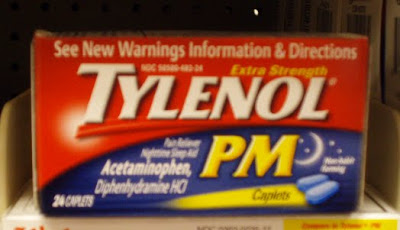 Makers of over-the-counter medications say the Food and Drug Administration's limit on acetaminophen will not affect them.
Makers of over-the-counter medications say the Food and Drug Administration's limit on acetaminophen will not affect them.Drug companies discussing new limits on acetaminophen in prescriptions
by Alexandra Arkin
Jan 21, 2011
Alexandra Arkin / MEDILL
FDA calls for limits and warning labels for acetaminophen in prescriptions
FDA News Release
Acetaminophen InformationDrug companies are in the process of evaluating the U.S. Food and Drug Administration’s new guidelines limiting the amount of acetaminophen in prescription drugs to 325 milligrams per dose. High daily levels of acetaminophen use have been linked to the risk of serious liver injury.
In its Jan. 13 announcement, the FDA also said that manufacturers must update the labels of all prescription combination acetaminophen products to warn consumers of the potential risk. These drugs include Tylenol with Codeine, Percocet and Vicodin.
Abbott Laboratories in Abbott Park makes Vicodin. The company is evaluating the FDA’s guidelines to make sure it is in compliance, said Elizabeth Hoff, Abbott spokeswoman.
She stressed that many other pharmaceutical companies make generic versions of Vicodin which may have different amounts of acetaminophen. “The Vicodin brand is less than 1 percent of all prescriptions filled for hydrocodone with acetaminophen,” she said. She would not elaborate on whether the FDA’s guidelines might affect Abbott’s bottom line.
Abbott currently makes Vicodin with acetaminophen in three different strengths: one with 500 mg of acetaminophen and 5 mg of hydrocodone, one with 750 mg of acetaminophen and 7.5 mg of hydrocodone, and one with 660 mg of acetaminophen and 10 mg of hydrocodone.
Representatives of Teva Pharmaceuticals and Watson Pharmaceuticals, which make generic versions of brand-name drugs such as Tylenol with Codeine, were not available for interviews.
Acetaminophen, which is used to treat pain, fever, coughs, cold and flu, allergies and sleeplessness, is also found in over-the-counter products such as Tylenol, Excedrin, Theraflu and NyQuil, according to the products’ labels. The FDA's action does not affect OTC products, even though many OTC products currently have more than 325 mg of acetaminophen.
Nearly half of all cases of acetaminophen-related liver failure in the United States are the result of overdoses from prescription products with acetaminophen, according to the FDA. But about half the overdoses caused by acetaminophen are caused by unintentional overdoses when people combine prescription and OTC medications, said Dr. Donald Jensen, director of the Center for Liver Disease at the University of Chicago Medical Center.
“There are combinations of acetaminophen in so many products,” said Jensen. He said it is easy to go over the maximum amount of 4,000 mg of acetaminophen a day if a patient takes it in several forms.
The risk of acetaminophen-related liver failure is greatest when patients take multiple products with acetaminophen at once and exceed 4,000 mg within a 24-hour period, according to the FDA’s statement.
Normally, the liver breaks down and removes chemicals and toxins from the body. Too much acetaminophen overwhelms the liver’s ability to detoxify the body, leading to liver failure.
McNeil Consumer Healthcare is a division of McNeil-PPC, Inc., a company of Johnson & Johnson. McNeil, which makes Tylenol, said in a statement, “While (the FDA’s) guidance is specific to (prescription) products and does not impact over-the-counter products, McNeil Consumer Healthcare supports the FDA efforts to help reduce accidental overdose related to the use of prescription acetaminophen-containing products.” They would not comment further.
Excedrin is made by Novartis. Media contacts for Novartis Consumer Health could not be reached for interviews, but the company said in a statement that Excedrin products comply with dosing levels set forth by the FDA and are safe and effective when used as directed.
The FDA’s new regulations are the latest in a series of attempts to reduce the risk of acetaminophen-related liver injury. In June 2009, an FDA advisory committee recommended strengthening the warning about serious liver injury on the labels of prescriptions with acetaminophen.
Related Links
FDA calls for limits and warning labels for acetaminophen in prescriptions
FDA News Release
Acetaminophen Information
http://news.medill.northwestern.edu/chicago/news.aspx?id=176908
.
No comments:
Post a Comment